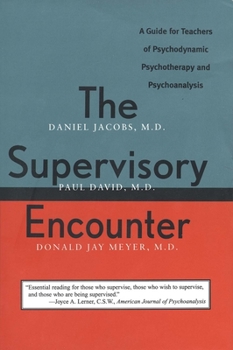The Supervisory Encounter: A Guide for Teachers of Psychodynamic Psychotherapy and Psychoanalysis
Select Format
Select Condition 
Book Overview
Good supervision is crucial to the training of any therapist. Yet most who are asked to supervise receive little instruction in how best to proceed. What is missing is a theory and technique of supervision that can help them be effective teachers, no matter from what mental health discipline they come. The authors of this book, who have supervised in a variety of educational settings and have taught students from a wide range of mental health disciplines, now provide a theoretical and technical framework for understanding and deepening the supervisory process. They clearly describe phases of supervision (from the opening session to termination), its goals, and the nature and purpose of a number of supervisory interventions. They delineate modes of thinking that are essential to being a good therapist and discuss how best to foster them. They demonstrate how supervision can be intimate, personal, and honest without becoming a form of therapy. Through clinical vignettes, they show how to diagnose impediments to learning and describe strategies for overcoming them. While providing an interesting history of supervision and a portrait of Freud as supervisor, they focus mainly on how newer theories such as self psychology, intersubjectivity, and an interactive two-person psychology influence the practice of supervision.
Format:Paperback
Language:English
ISBN:0300072775
ISBN13:9780300072778
Release Date:September 1997
Publisher:Yale University Press
Length:298 Pages
Weight:0.78 lbs.
Dimensions:0.8" x 5.5" x 8.2"
Customer Reviews
1 rating
An invaluable resource for teachers of psychotherapy.
Published by Thriftbooks.com User , 25 years ago
This is an essential book for the supervising psychotherapist, be the supervisor a psychologist, a marriage and family therapist, a psychiatrist, a social worker or an analyst.The authors succeed in conveying the subtleties and nuances of teaching psychodynamic psychotherapy and psychoanalysis in an easy to read and well-organized manner. The content is serious and clinically sophisticated. The authors' candor and many real life examples keep the reader riveted as specific supervisory encounters are presented along with clinically well thought out teaching strategies. Throughout the text suggested supervisory interventions are accompanied by clinical explanation.This book lends a refreshing clinical depth to the chapters dedicated to the opening phase of supervision, supervisory interventions and termination. In my opinion, the chapters on Self-Esteem Issues for the Supervisee and The Supervisor's Role reach the core of the delicate balance of the supervisory relationship. Other chapter titles include: Inductive and Associative Modes of Thought, Affect and Professional Development and, How Personal Should Supervision Be?In The Supervisory Encounter there is no dogmatic stance but instead the reader encounters an attitude that is tolerant of different individual styles of supervision and of learning. This attitude conveys compassion and respect for both the supervisee and the supervisor while maintaining the boundary and the distinction between psychotherapy and the teaching of psychotherapy.





